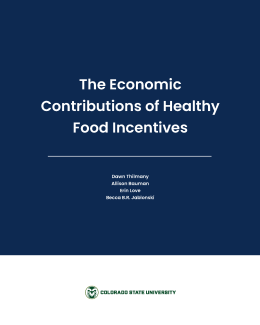For more than a decade, healthy food incentive programs have increased the purchasing power of low-income families to buy fruits and vegetables. Numerous non-profits and government agencies, including SPUR, run these programs using a variety of program designs, marketed with different names, in nearly every state of the country. Despite this variety, a commonality of these programs is that they provide people, most often families and individuals enrolled in the Supplemental Nutrition Assistance Program (SNAP, formerly known as food stamps), with more money to buy produce at grocery stores, corners stores, and farmers’ markets. Another commonality is that research consistently demonstrates that healthy food incentive programs reduce hunger, improve nutrition, and support the local agriculture and retail sectors.
Some of the programs operating across the country today are quite large and well-established. Others are just getting started. Regardless of their current program reach, they all share the potential to benefit far more people, retailers, farmers and communities if they expanded more broadly – for example across states or the entire country. That level of expansion would require a significant investment from policymakers.
This pioneering study shows that broad expansions of healthy food incentives would provide powerful returns on that investment – for families, grocers, and farmers, as well as more broadly among the state economies where such benefits are expanded. The findings demonstrate that state and federal policymakers would be wise to double down on their support for these programs.
The research was initiated by Fair Food Network and SPUR, in collaboration with ten partner organizations that operate incentive programs in states across the country, and was conducted by a team of agricultural economists at Colorado State University led by Dr. Dawn Thilmany.
In addition to the full report, available below, we will soon post individual briefs summarizing the economic benefits of expanding incentive programs in each state highlighted in the report and nationwide.
